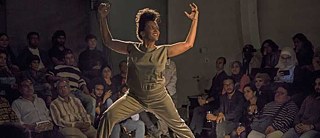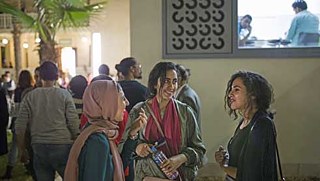Tashweesh-Festival in Cairo
Loud, Louder, Tashweesh!

At the Goethe-Institut’s Tashweesh Festival, artists and intellectuals from North Africa, Europe and the Middle East met to discuss stereotypical gender images. After Brussels, the mammoth project stopped in Cairo for a week and brought together feminist positions.
The buzz of voices, traffic noise, chants of the muezzins. Cairo is loud – and tashweesh is omnipresent. The Arabic word refers to the background noise in a telephone conversation or the roar of a crowd. At the eponymous festival by the Goethe-Institut, feminists come together to exchange ideas and network. Artists, academics and activists from countries where Arabic is the official language and from various European countries attended the second Tashweesh stop in Cairo. After opening in Brussels, the festival made the multitude of feminist voices audible and provided a platform for the debate on stereotypical gender images in the largest city in Africa from 6 to 12 November. It was a mammoth project that took two years to prepare, as Johanna Keller, director of the cultural programme at the Goethe-Institut Cairo, explains in her opening speech.
Criticism of Normalisation
One of the feminists presenting her work is Salma El Tarzi. The award-winning documentary filmmaker is presently working on sexism in commercial Egyptian film. In an installation as well as a lecture, the Cairo native analyses how rape and sexual assault are normalised in cinema and thus simultaneously reflect and manifest social conditions. The forty-year-old projects scenes of molestation from popular films on the wall. During the screening, some men in the audience laugh. El Tarzi is visibly angry about that. She then comments, “What we’re laughing about are physical assaults, rape attempts and trespassing. How can we see something like that and think it’s funny? That’s totally normalised.” The audience applauds: a performative kind of feminist networking.
Spoken Word against Discrimination
There is also exchange on the stages of the Tashweesh Festival with performances, round tables, workshops, concerts, readings and DJ sets. Almost all of the event rooms are packed. The Belgian performer Samira Saleh will be hosting a spoken word event on Saturday evening where feminists will bring their emancipatory art to the stage. “Thank you for allowing me to perform here and for Cairo greeting me more warmly than Germany has ever done,” comments Mona Moon from Berlin.
Not in the same boat
Conditions reproducing colonialism are disrupted by the involvement of non-white feminists from the global North. The Indian political scientist Nikita Dhawan, who teaches at the University of Innsbruck and is one of the most important postcolonial theorists in German-speaking countries, talks about white feminism in Germany. “The German sociologist Beck argues that we are all in the same boat. I say maybe we are all facing same storm, but we are not in the same boat.” She criticises the idea of a supposedly global sisterhood.Feminists get loud
The painter Imane Ibrahim is enthusiastic, saying, “For me as a young Egyptian artist, this festival is a great opportunity. It’s very important to get together with other young people from the Arab region and Euro-Arab people.” She applied for the Open Call, which was open to artists, activists and academics from all over the Arab world. “I just met two other Egyptian artists I didn’t know before. So we’re not only networking internationally, but also at a local level. That’s great!” continues the 28-year-old. The feminists are getting louder and louder, not as a tashweesh but into the megaphone.